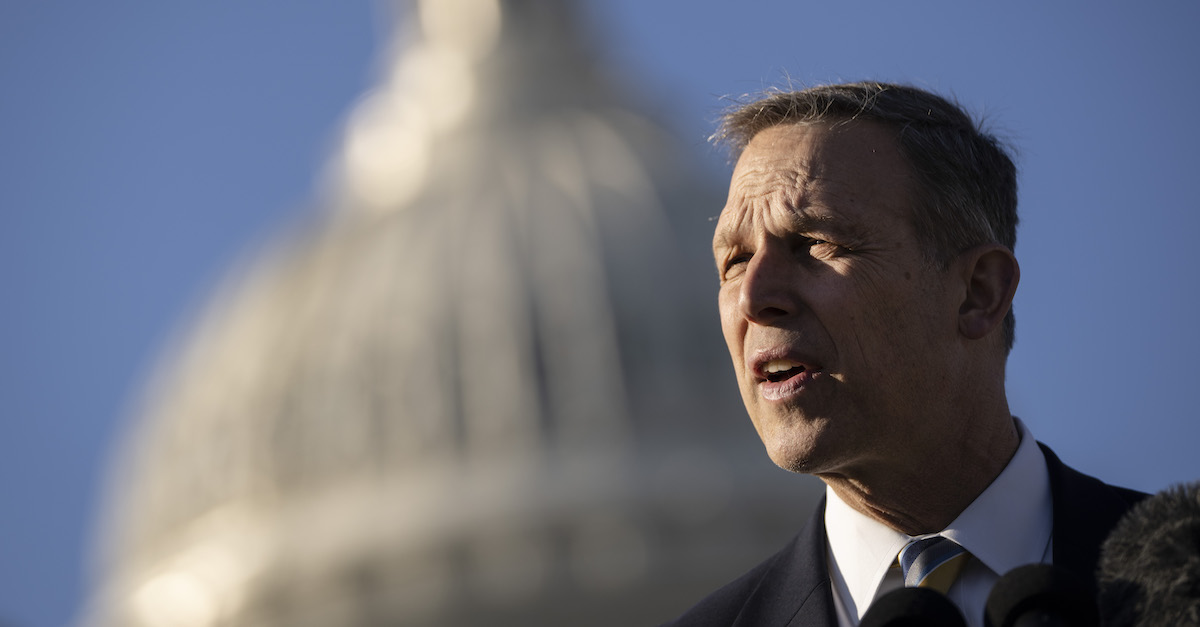
WASHINGTON, DC – FEBRUARY 28: Rep. Scott Perry (R-Penn.) speaks during a news conference with members of the House Freedom Caucus outside the U.S. Capitol on Feb. 28, 2022 in Washington.
A Republican congressman who once allegedly sought a pardon from former president Donald Trump in the wake of the Jan. 6, 2021 attack on the U.S. Capitol, Rep. Scott Perry of Pennsylvania, has been ordered by a federal judge to hand over 1,650 text and email records sought by investigators.
The ruling issued Tuesday from Chief U.S. District Judge James Boasberg is the latest development in an extensive battle over the records and marks a significant loss for Perry who has tried to shield certain documents from prying eyes ever since FBI agents first seized his phone last August.
The seizure was part of a larger probe into efforts to interfere in the 2020 election and it occurred long before Trump was indicted and special counsel Jack Smith was tasked to prosecute him in Washington.
Interest in Perry first arose as the Justice Department began investigating Jeffrey Clark, the former DOJ lawyer under Trump who is now charged in Georgia — along with Trump and 16 others — for allegedly trying to pull off a fake elector scheme in the state.
Perry introduced Clark to Trump and communicated often with other figures integral to the alleged scheme to overturn the election like John Eastman and former DOJ official Ken Klukowski. The congressman has steadfastly denied any wrongdoing.
The select Jan. 6 committee obtained messages from Trump’s former chief of staff Mark Meadows showing Perry using the encrypted app Signal to speak with him. In the messages, Perry would share conspiracy theories with Meadows about election fraud including accusations that Italy, the United Kingdom and China hacked U.S. voting machines and that former CIA director Gina Haspel was part of a cover-up to get Joe Biden elected.
When Meadows’ aide Cassidy Hutchinson testified under oath to the select committee, she said Perry had attended meetings where Trump and his lawyers and allies would discuss the fake elector scheme. Once things went haywire on Jan. 6, she testified, Perry sought a pardon preemptively.
At the time of her testimony, Perry called that a “soulless lie.”
He has adamantly opposed review of his communications and has asserted that as a congressman, the “speech and debate clause” afforded to lawmakers to keep their official, work-related correspondence private, protected his documents from scrutiny, namely, just over 2,200 texts and emails sought by investigators.
But Boasberg’s ruling this week found that many of those messages in the bunch — 1,659 to be exact — were not protected by the speech and debate clause because they weren’t communications actually related to his legislative duties.
This, Boasberg noted Tuesday, was in line with a ruling from the judge who first considered the matter: U.S. District Judge Beryl Howell.
Howell found most of the communications Perry said were covered by speech and debate did not meet the clause’s criteria because they appeared to be attempts at political influence, not legislative duty.
These messages should be released because they were in the public interest, the judge found, though she acknowledged there were 161 records Perry could appropriately hold back.
Some of Perry’s communications were unsealed this November, Politico reported. It appears to have been an inadvertent disclosure on the court docket since as soon as the messages showed up in a filing, the document went back under seal.
The communications were with Perry’s messages with numerous Trump allies and officials, including former Justice Department colleagues plus Republican National Committee chairwoman Ronna McDaniel. Perry spoke about a push to challenge Biden’s victory in 2020 and also appeared to “embrace a plan” to have Mike Pence, then Vice President, “admit testimony” about so-called fraud before certifying the vote on Jan. 6.
Politico reported Perry offered this idea to DOJ official Robert Gasaway in the week before the Capitol assault. Perry purportedly “agreed to sell the idea with a call to Trump” but found himself rebuffed by Pence’s chief of staff, Marc Short.
When Howell first ordered the texts released, Perry appealed the ruling and temporarily won a stay on the decision, though it wasn’t much of a victory: The ruling directed Perry’s emails, texts, and other correspondence to Boasberg for his personal assessment of them under the speech and debate clause.
Boasberg ruled Tuesday that after analyzing 2,055 documents at issue, only 396 were protected.
The judge gave Perry until Dec. 27 to comply.
An attorney for Perry could not immediately be reached for comment.
Have a tip we should know? [email protected]

